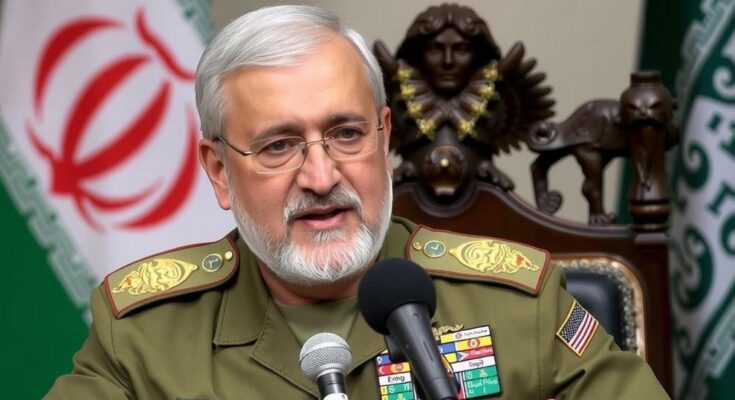Brigadier General Behrouz Esbati of Iran acknowledges a severe defeat in Syria, blaming both the Syrian leadership and Russia for the setbacks. He criticizes Assad’s rejection of Iranian military proposals and alleges Russia misled Iran by failing to target rebel positions adequately. Despite setbacks, Esbati remains optimistic about Iran’s influence and operational capabilities in the region, citing ongoing support networks and strategic resilience.
In a significant admission, Brigadier General Behrouz Esbati of the Iranian military has publicly conceded that Iran suffered a “very bad defeat” in Syria, marking a departure from Tehran’s previous claims of strength and resilience. Speaking at a mosque in Tehran, Esbati expressed regret over the loss, stating, “I don’t consider losing Syria something to be proud of,” and emphasized the severe challenges faced by Iranian forces following the events in Damascus.
Esbati criticized the leadership of Syrian President Bashar Assad, revealing that tensions arose from Assad’s rejection of Iranian proposals to launch attacks on Israel from Syrian soil. The general also blamed Russia, a vital ally, for misleading Iranian forces. He alleged that Russian military actions included bombing empty fields instead of targeting rebel positions and deactivating radar systems during Israeli strikes against Iranian interests in Syria.
Additionally, Esbati disclosed that Iran had attempted to establish a collaborative military presence in Syria to engage Israeli forces, but Assad’s lack of cooperation hindered these efforts. He noted that he was on the final Iranian flight departing Damascus just prior to the capital’s fall to rebels.
In response to inquiries regarding Iran’s military ambitions following the assassination of Hezbollah leader Hassan Nasrallah, Esbati acknowledged prior missile strikes against Israel but deemed additional retaliatory actions unfeasible due to current constraints. He articulated Iran’s capacity to mobilize resistance against new leadership in Syria, emphasizing strategic community engagement to establish operational networks.
Despite admitting to Iran’s setbacks in Syria, Esbati affirmed the continuing influence of Iran and its affiliates in the region, suggesting that the prevailing chaos might ultimately provide Iran with leverage under the new regime. He categorized the collapse of Assad’s government as a result of various factors, including widespread corruption and economic disarray, while reiterating Iran’s warnings for essential reforms that went unheeded.
When discussing Iran’s limited military responses to U.S. bases in the region, Esbati pointed to the potential for significant American retaliation and acknowledged limitations in Iran’s missile capabilities against advanced U.S. defense systems.
Esbati’s frank disclosures highlight the evolving dynamics of Iranian involvement in Syria and the strategic recalibrations required in light of recent military and political developments.
The involvement of Iran in Syria has been a point of contention and strategic interest for both Iranian and regional allies. Despite previously projecting an image of strength in its military operations alongside Assad’s government, recent statements from senior Iranian officials indicate a stark realization of the difficulties faced in maintaining influence in the region. Brigadier General Behrouz Esbati’s comments underline the challenges stemming from internal Syrian politics and the complexities introduced by ally dynamics, particularly with Russia, revealing fractures in the previously cohesive military narrative.
The admissions made by Brigadier General Behrouz Esbati signal a significant shift in Iran’s portrayal of its military engagements in Syria. Acknowledging severe setbacks, Esbati’s critiques of Assad and Russia illustrate the complexities faced by Iran in navigating its alliances and military objectives. Despite these challenges, he emphasized Iran’s continued influence and potential for resistance in the region, suggesting a persistence in Iranian strategic interests despite evolving circumstances.
Original Source: www.ynetnews.com




